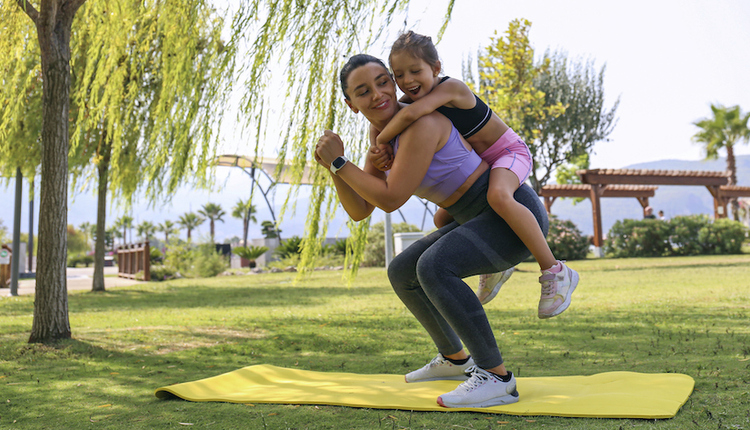
The post-pregnancy period is a remarkable journey for new moms, marked by the joy of motherhood and all the physical changes and mental challenges that come with it. As fitness professionals, it's crucial to understand that this phase is exceptionally vulnerable for new moms after experiencing such a significant physical event. Unfortunately, many trainers are not adequately trained to handle this delicate time, leading to misconceptions and potentially harmful advice. Let's dive into the dos and don'ts every fitness professional needs to know when working with postpartum clients.
Post-Pregnancy Dos:
1. Educate on Women's Prenatal and Postpartum Health
It's essential for fitness professionals to educate themselves on prenatal and postpartum health. Understanding the physiological changes that occur during pregnancy and childbirth will help create appropriate and effective fitness programs tailored to each new mom's needs.
Look for accredited courses or world-renowned specialists in this area. There are also a lot of great resources available, for example, from ACOG (The American College of Obstetricians and Gynecologists) and others.
2. Focus on Pelvic Health and Diastasis Recti
Pelvic health and diastasis recti (abdominal muscle separation) are critical aspects of post-pregnancy recovery.
Pelvic floor dysfunction is very common postpartum, and it can manifest in different ways or not at all if it’s asymptomatic. According to the systematic review* published in 2021, where over 35,000 women were observed, about a third of these women (31%) had urinary incontinence at three months postpartum and about the same amount (32%) at one year postpartum. Besides urinary incontinence, new moms can deal with tears, pelvic organ prolapse, heaviness, pelvic pain and other issues.
In addition to the stretched or injured pelvic floor, women end up with stretched abdominal muscles and a weakened core. Knowing how to address diastasis through specific exercises, and strengthen the core holistically without causing further harm, is essential if you work with postpartum clients
3. Offer an Appropriate Postpartum Recovery Program
It’s very common to see programs created like a “deload version” of a regular fitness routine. Even if we have a woman with uncomplicated pregnancy and delivery and who has no symptoms. e.g., heaviness or incontinence, we still can’t skip the recovery period. Just “taking it easy” is not an appropriate rehab after such a major physical event as birth. And if a mom had a C-section, she is still recovering after a major abdominal surgery, so we need to take it into consideration and handle it responsibly. Just like we wouldn’t put someone on a regular leg day routine but with light weights right after knee surgery, we wouldn’t skip the postpartum recovery program before we start with easy training.
Fitness professionals should design individualized recovery programs that consider factors like the type of delivery, the new mom’s fitness level before and during pregnancy, and any existing conditions.
4. Build a Network of Health Professionals
And that’s why collaborating with pelvic physiotherapists, nutritionists, pre- and postnatal coaches and healthcare providers is essential for you. This network allows fitness professionals to refer clients to specialists if they are unsure about safely training a woman or if the scope of their expertise doesn’t cover specific concerns.
5. Be Someone She Can Trust
Post-pregnancy can be overwhelming for new moms, and they need a fitness professional they can trust and confide in. Create a supportive and nurturing environment, actively listening to their concerns and progress and adjusting the program as needed.
Post-Pregnancy Don'ts:
1. Don’t Prescribe Only Kegels and Planks
While Kegel exercises and planks have their place in postpartum recovery, they are not the entire solution. If you can’t assess the pelvic floor and diastasis, refer your client to the according specialist and build your program around the specialist’s advice. Remember that strengthening the pelvic floor and addressing diastasis goes way beyond Kegels and planks. In fact, doing only these, in some cases, might mean not addressing the issue at all or even worsening the situation.
2. Don’t Suggest Avoiding Weight Training Completely
Sometimes fitness professionals are not sure how to work with a client who has just given birth, so they recommend waiting out and avoiding weight training completely or doing something like yoga instead. Weight training can be beneficial for postpartum women, but it needs to be approached with care and caution. Instead of avoiding it altogether, emphasize proper form and technique and gradually progress the intensity based on the individual's abilities. Or, if you are not trained in this area, refer her to someone who can support her during this period.
3. Don’t Focus Only on Deep Core and Pelvic Floor
Strengthening the deep core and pelvic floor is crucial, but it should not come at the expense of neglecting other abdominal muscles. A well-rounded approach targeting all abdominal muscles will improve overall core strength and functionality.
If the early postpartum recovery was done appropriately, your client will have a relatively strong deep core and maybe even pelvic floor muscles but could still struggle with ab exercises, withstanding the intraabdominal pressure or have diastasis. Just like in regular weight lifting, we need to build in the progressive overload here and continue strengthening the core and whole body.
4. Don’t Put Pressure on a New Mom
The "push mentality" is widespread among fitness trainers, but this is not the time for that. Sometimes eating just one healthy meal is a huge win already. Sometimes working out just for 5 minutes is all new moms can do, physically and mentally. And sometimes, they don't even have 5 minutes.
Postpartum recovery is a gradual process, and each woman's journey is unique. Avoid pressuring new moms to adhere strictly to a specific timeline or fitness plan. Instead, support them in making sustainable progress while acknowledging their achievements, no matter how small.
5. Prescribe Rigid Meal Plans for Breastfeeding Moms
Breastfeeding moms have unique nutritional needs, and rigid meal plans may align neither with their requirements nor the daily mom-life reality. Encourage a balanced and varied diet that supports both postpartum recovery and breastfeeding while also considering individual preferences and dietary restrictions.
As fitness professionals, it's essential to approach post-pregnancy fitness with sensitivity and knowledge. Building a network of health professionals, educating yourselves on prenatal and postpartum health, focusing on pelvic health and diastasis recti, and offering personalized recovery programs are vital steps in supporting new moms on their fitness journey. And remember that post-pregnancy fitness is not just about physical changes. It's about empowering new moms to embrace their strength and resilience in the motherhood journey and showing them that they can indeed feel and look great and be confident and strong in their new bodies.
Elena Biedert is an award-winning pre- and postnatal coach, internationally published author and model. Driven by her son’s traumatic birth with an unexpected c-section that almost took her life, Elena founded "Mama Fitness Coaching“ to support other mothers. With a holistic approach, Elena focuses on helping new mothers recover and reach their fitness goals post-pregnancy, so that they can feel confident and strong without sacrificing time with their loved ones. You can learn more at MamaFitnessCoaching.com or contact Elena on Instagram @mamafitnesscoaching.


















